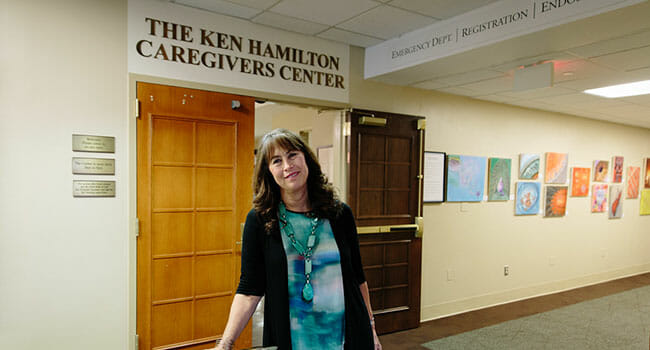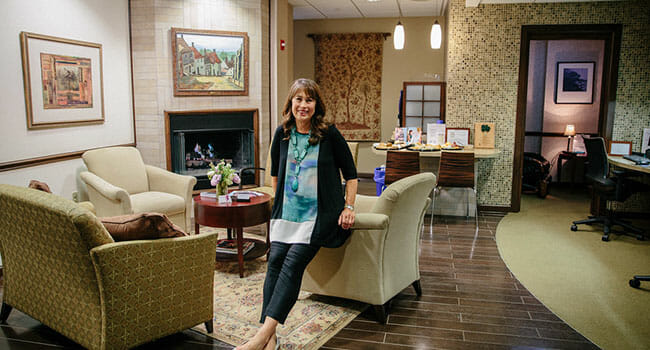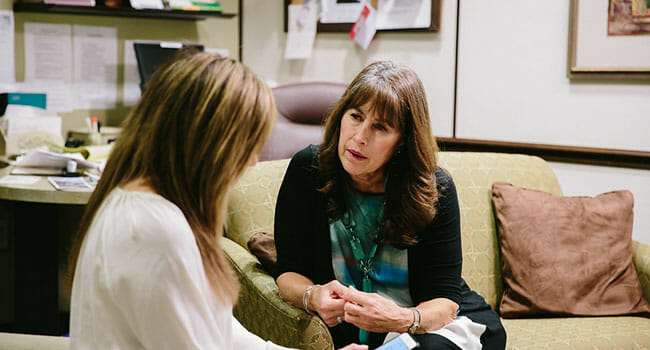After Caring for Her Husband, She Founded a Center to Help Caregivers Get the Support They Need

Each year, L’Oréal Paris and Points of Light recognize, celebrate and support Women of Worth who make a beautiful difference in their communities. For exceptional commitment to service, 10 honorees each receive a $10,000 grant to support their most cherished cause. One honoree, selected during the open online vote, receives an additional $25,000 grant.

“Caregivers are an underserved population. It’s a silent population. People don’t realize how stressful it is,” said Marian Hamilton. “The life you had before doesn’t exist while you’re going through it. There needs to be a paradigm shift in the way hospitals view the family caregiver and how caregivers view themselves in getting more help.
Hamilton found herself in the bewildering, exhausting role of full-time caretaker in 2002, when her husband, Ken, was diagnosed with mesothelioma, an asbestos-related cancer of the lungs. The pair spent two years in and out of four different hospitals in the New York City area.
“He was getting good care, but I felt myself, as the primary caregiver, was always at my wit’s end, feeling so stressed out and so sick, trying to take care of him and my two teenage daughters,” said Hamilton. “I really felt that what would have been helpful to me was some place in the hospital – a caregiver’s center – where there would be somebody for me to speak to.”
One memory in particular bothers her: “My husband had been in treatment for a while, and he was in remission. Then he went back to the hospital for a checkup. I remember being in the lobby of the hospital and I got a call from the doctor, telling me my husband’s cancer was back. I burst out crying and not one person came up to me, to help me, to support me, to say anything to me, to see if I was all right. That was a wake-up moment for me to say, ‘Wow, hospitals needed to have a better way to deal with families.’”
After her husband died, Hamilton floated her idea to local hospitals and eventually found a receptive home at Northern Westchester Hospital. The Ken Hamilton Caregivers Center was launched in 2006 and quickly resonated with the community.

“We’ve raised more than $2 million,” said Hamilton. A soothingly furnished suite was built within the hospital, where caregivers can relax or meet privately with social workers, doctors, pastors, and others. A small endowment was established to pay for a full-time social worker and a part-time administrator who helps Hamilton set up similar centers in other hospitals. Volunteers, often coming from the ranks of former caregivers themselves, provide the key element of human support.
At least 10 other hospitals have replicated the KHCC – the need exists nationwide. Jerri Rosenfeld, a social worker who gave up her own clinical practice to work for the KHCC, noted, “Hospital stays are so much shorter now, so family caretakers have to take on more and more. We’re asking people to go home and change dressings and drain feeding tubes, etc. They’re completely overwhelmed.”
Ellen Travis, a volunteer, notes that anyone can be thrust into a caregiver’s role – or become a patient who’s dependent on family caregivers. She’s been both. During her father’s last six years of life, Travis, then a busy mother of four teenagers, juggled her own family’s needs with his repeated hospitalizations.
“There’s really nothing more isolating than those long days and nights, just sitting in a chair, waiting to see the doctor, waiting for information, feeling frustrated and the weight of the responsibility on your shoulders,” she said. Later, when Travis herself needed treatment for breast cancer, the newly created KHCC helped her family. Volunteers even sat with Travis during her chemotherapy sessions.
The KHCC concept helps hospitals in a multitude of ways, said Rosenfeld. “We’ve become the voice of the caregiver in the hospital. I sit on the ethics committee. I’m on the palliative care team. I attend rounds. We’re constantly sought out by doctors to attend meetings with families, to be a witness to what they’re telling the family, to help with the vocabulary, to help them deliver difficult messages.”
Rosenfeld said the hospital has improved its patient satisfaction ratings and has received hundreds of letters from grateful patients and families. “But the impact I’m most proud of is that so many volunteers are former recipients of our services,” she added.
The KHCC might be the first program of its kind to set aside a specific physical space in a hospital for caregivers. Cozy furnishings, a fireplace, and a gently gurgling fountain provide a soothing atmosphere for reflection and consultations. A bank of computers allows caregivers to check email or research medical information. Healthy snacks and beverages are also provided.

Volunteers provide nonjudgmental emotional support, but also practical assistance in everything from completing advance care directives to mediating disputes among family members over a loved one’s care. “We’ll go to care planning meetings; we help with physical discharges; we do a lot of end-of-life counseling. We’re the liaison between the families, the patients, and the care staff,” said Rosenfeld. Hamilton’s group has alerted many a doctor to a patient’s or family’s unspoken concerns or questions. In addition, the KHCC holds regular debriefings among staff to discuss how cases have been handled and ways to improve the program.
Hamilton is a frequent speaker in the community, and the center holds caregiver support groups for anyone interested, whether or not they are affiliated with or receive care at Northern Westchester. She continues to look for new ways to help caregivers. Last year, she launched an additional program called Stay in Touch on a pilot basis.
“One of the things I always wanted to do when I started the program 10 years ago was to help volunteers stay in touch with families,” said Hamilton. “Once you leave the hospital, that’s when your isolation is the greatest and you feel so alone and so stressed out. Stay in touch could remain a lifeline for them.
Hamilton and the Ken Hamilton Caregivers Center’s programming have been recognized by many different organizations. In 2014, the Caregiver Action Network awarded its Caregiver of the Year to Marian Hamilton and its Excellence in Patient and Family Engagement to the KHCC. At Northern Westchester Hospital’s annual gala, Hamilton was named Community Honoree. Hamilton also received the Quality of Life award from Volunteer New York, a division of United Way, and a Daily Point of Light Award.
Hamilton envisions several good uses for the L’Oréal Paris Women of Worth funds. “We have a replication program whereby we help other hospitals start their own caregiver programs,” she said. “We have written materials and a step-by-step manual that we give them. I’d love to make instructional videos that would show how to train volunteers, because that is the most time-consuming and challenging part of a caregiver program.” For example, Hamilton said a video could portray how to react when a caregiver is extremely upset, as well as many other scenarios.
“I’d also love to be able to put some of the money toward our new Stay in Touch program,” Hamilton added. “Since we piloted it a year ago, our statistics show it’s been successful; however, we don’t really have the staff to run this program. I would like to be able to hire a part-time social worker to run it. … In addition, I’d love to be able to provide more integrative services for our families, for example, a chair massage once a week.”
Finally, Hamilton would like to be able to bring in paid speakers for the program’s yearly symposiums.
Hamilton is frequently praised for her far-reaching goals. Rosenfeld, who has known her for decades, said Hamilton has always given back to the community, serving on school and library boards and being active in parent-teacher organizations. “Now her mission is that every hospital should have a caregiver system,” said Rosenfeld. “She is a true visionary.
Show your support for Marian Hamilton by voting for her, and learn more about the other extraordinary L’Oréal Women of Worth honorees.
